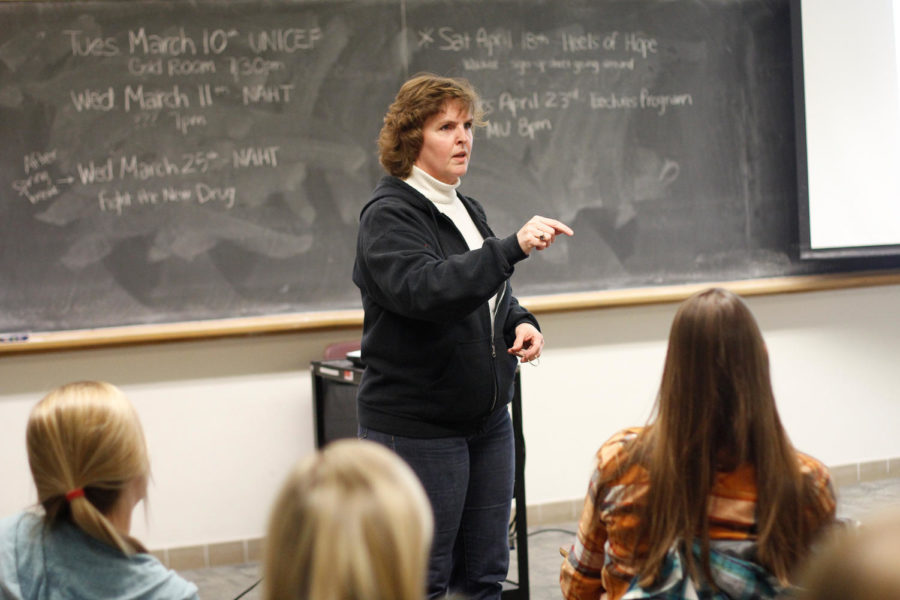Mother of a human trafficking survivor shares her story
Danielle Ferguson/Iowa State Daily
Ruth Buckels, coordinator for Achieving Maximum Potential or AMP, shared her experience as the mother of a human trafficking survivor with the ISU Network Against Human Trafficking organization March 2.
March 4, 2015
Ruth Buckel remembers the exact moment when she found out her daughter was sex trafficked.
Buckels, coordinator for Achieving Maximum Potential or AMP, a statewide group that seeks to help foster and adoptive children in Iowa reach their full potential, shared her story as the mother of a human trafficking victim at the ISU Network Against Human Trafficking meeting Monday.
“I was at this end of my kitchen counter and my beautiful daughter was across from me,” Buckels said of that 2008 day.
Buckels found out about her daughter Brittany’s experience seven months after Brittany had been living with Buckels through a phone call from a male Illinois investigator who asked for Brittany over the phone.
“I’m a foster parent. I’m ridiculously over-protective,” Buckels said. “I don’t use [their] last names.”
Buckels said she was loudly rude over the phone and hung up. Brittany had heard this conversation and came down the stairs.
The phone rang again, this time a female.
“Brittany is our star witness,” the voice on the other end told Buckels.
“I’m watching [Brittany] and I said, ‘witness to what?’ The woman on the phone says, ‘they didn’t tell you?’” Buckels said.
She was trafficked, the voice said.
Sex trafficking occurs when a person is exploited to perform commercial sex acts by some form of force, fraud or coercion against his or her will.
“Trafficked. Holy cow. I sat down pretty good,” Buckels said. “So many pieces of her life came into focus for me.”
Buckels has been a foster mom since 1988 and has since then housed 90 foster teenagers, six of whom were trafficking survivors. One of these was her now-daughter, Brittany.
Brittany’s father passed away when she was 7 years old. For years, her mother’s boyfriend sexually abused her. She was placed in a treatment facility in Iowa City. From there, she met another girl who was in the facility after being taken from her home because of abuse and drug usage. They ran away to her friend’s home in Cedar Rapids, where her step dad tried to sexually abuse both of them.
“After a few days of being treated like that I left their house while her stepfather was gone,” Brittany wrote in a previous email interview with the Daily.
She was at a Hy-Vee in Cedar Rapids trying to buy food when a man approached her asking if she wanted a modeling job.
She needed the money, so she went with him and he gave her the first job.
“He said that I would have to go up to this apartment and knock on the door and tell the guy that I was there to do a job and then I would have to pleasure the man sexually and he would give me money, then I was to come back out to him and give him the money and we would leave,” she wrote.
Brittany was trafficked between Iowa and Illinois at the age of 14 before being rescued by an Illinois police officer who was pretending to buy sex.
This, Buckels said, is the oldest of the average age range at which children are sought after to for trafficking, but she has heard of children as young as 3 months old and a woman as old as 71 trapped in a sex trafficking ring.
Buckels shared some of her experiences with being the mother of human trafficking survivors with the group. Another daughter of Buckels was exploited by her daughter’s grandmother. The grandmother was making video tapes of her engaging in sexual acts with “grandma’s boyfriends.”
Buckels also shared victim tracking information with the group of 18 students, including where traffickers look and who they target.
Homeless and runaway youth are the most vulnerable to be trafficked, she said, and foster children are among the most likely to run away.
In Iowa, there are about 4,000 children in the foster care system and Iowa ranks fourth in the nation for children vulnerability to be homeless, according to Homeless Children America.
Primary recruiters in Iowa, pimps or johns, terms for traffickers, are most likely between the ages of 15 and 25, Buckels said. Half of these perpetrators are women and the other half is often young, attractive men who are charming.
“Because they are so warm and inviting, maybe you trust them with your child early,” Buckels said. “Their job is to get into your child’s world … and then I pull [them] into the world of sex trafficking.”
Recruiting is rampant in junior and high schools, Buckels said. The time at which children are most vulnerable is right as school lets out for the day. Any time when a parent isn’t watching their children is a place where those children are vulnerable, from movie theaters to bowling alleys.
“I always start sweating when the kids go to a movie theater,” Buckels said.
Teresa Downing-Matibag, professor of sociology and executive director of the Iowa Network Against Human Trafficking, shared an opportunity to take action now and send a petition to county attorneys to pass anti-trafficking legislation.
For those interested in getting more involved with human trafficking, Buckels said education, prevention, awareness and observance are among the best practices.
“You are going to be the ones telling [people]. People will start to wonder, ‘why are these young people worried?’” Buckels said. “It’s the education. It’s bringing it up in conversation It’s the social justice classes. Anything that you can bring up and say, ‘what are we going to do?’”

















